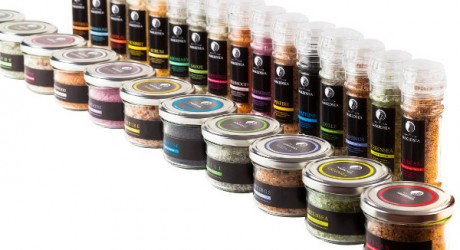Ari Fruchter’s New Dead Sea Project
Oct 31, 2013
‘The World’s Healthiest Gourmet Sea Salt That Will Also Promote Peace’

“It’s the world’s healthiest gourmet sea salt,” says Naked Sea Salt, a new Israeli startup which partners with a Palestinian company to harvest salt from Dead Sea. The small startup set up a Kickstarter campaign to get the ball rolling – and already doubled its target just 48 hours after launch.
Entrepreneur Ari Fruchter, Naked Sea Salt’s founder and CEO, is no stranger to the Dead Sea. It was Fruchter who brought international photographer Spencer Tunick to Israel in 2011, in order to raise awareness to the deteriorating condition of the world’s lowest point on land, by photographing hundreds of naked Israelis floating in the famously saline sea.
While organizing the event, Fruchtman came across a Palestinian factory owner called Sam Hallhu who was using eco-friendly methods to harvest salt from the Dead Sea – and so Naked Sea Salt was born.
“The West Bank Salt Company has been operating since 1964,” Fruchter tells NoCamels, “selling plain salt to the Arab market. Together, we made it a premium product.”
Good for the body and the environment
Naked Sea Salt has as its mission to produce an all-natural, low-sodium, and mineral-rich alternative to artificially refined salt. The first focal point is making a healthy product, says Fruchter. The salt harvested is naturally low in sodium, and unlike other salt manufacturers, Naked Sea Salt does not refine the salt or add any chemicals, which also accomplishes the company’s aim of producing an all-natural product.
Fruchter claims that his venture is as green as it gets and will not harm the Dead Sea’s frail ecosystem, which some experts believe will lead to the drying up of the sea by 2050.
“Our company’s declared mission is to serve as a model of sustainable, ethical practice for private manufacturing companies in the region,” says Fruchter.
“There’s an organization called Friends of the Earth Middle East, who came voluntarily to inspect our operations and concluded that our effect on the Dead Sea is negligible,” Fruchter tells NoCamels. “We harvest the salt from salt ponds outside the Dead Sea. We use Dead Sea water to clean [the salt] and return the water back to the sea. So we don’t damage the environment.”
“We have an ongoing relationship with the Arava Institute to promote their goals of preserving the Dead Sea,” adds Fruchter, who is himself a long-time environmental activist.
Read the full article here.



